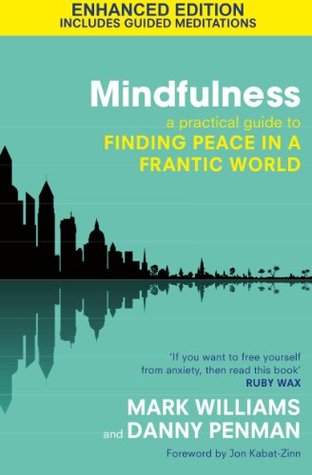More on this book
Community
Kindle Notes & Highlights
put yourself in the experienced hands of Mark Williams and Danny Penman, and give yourself over to their guidance and to the programme that they map out. The programme provides a coherent structure, an architecture if you will, within which you can observe your own mind and body and life unfolding, and a systematic and trustworthy approach for working with whatever arises.
May you derive great benefit from engaging in this programme and its invitation to explore how you might be in a wiser and more fulfilling relationship to your ‘one wild and precious life.’ Jon Kabat-Zinn Boston, Massachusetts December, 2010
https://soundcloud.com/hachetteaudiouk/sets/mindfulness-a-practical-guide-to-finding-peace-in-a-frantic-world
Numerous psychological studies have shown that regular meditators are happier and more contented than average.1 These are not just important results in themselves but have huge medical significance as such positive emotions are linked to a longer and healthier life.
I think of myself as generally happy, but every so often I’m struck by a fleeting mood of unhappiness or anxiety that quickly escalates. On a really bad day, I may spend hours stuck in angst-ridden maunderings, wondering if I need to make major changes in my life. It’s usually then that I realise I’ve forgotten to eat lunch. One tuna sandwich later, the mood is gone. And yet, ‘Am I hungry?’ is never my first response to feeling bad: my brain, apparently, would prefer to distress itself with reflections on the ultimate meaninglessness of human existence than to direct my body to a nearby branch
...more
But tension, unhappiness or exhaustion aren’t ‘problems’ that can be solved. They are emotions. They reflect states of mind and body. As such, they cannot be solved – only felt. Once you’ve felt them – that is, acknowledged their existence – and let go of the tendency to explain or get rid of them, they are much more likely to vanish naturally, like the mist on a spring morning.
People genuinely believe that if they worry enough over their unhappiness they will eventually find a solution. They just need to make one last heave – think a little more about the problem … But research shows the opposite: in fact, brooding reduces our ability to solve problems; and it’s absolutely hopeless for dealing with emotional difficulties.
The evidence is clear: brooding is the problem, not the solution.
Pure awareness transcends thinking. It allows you to step outside the chattering negative self-talk and your reactive impulses and emotions. It allows you to look at the world once again with open eyes. And when you do so, a sense of wonder and quiet contentment begins to reappear in your life.
The real voyage of discovery consists not in seeking out new landscapes but in having new eyes. (ATTRIB. MARCEL PROUST, 1871–1922)
Doing mode (see p. 28)
Mindful awareness – or mindfulness – spontaneously arises out of this Being mode when we learn to pay attention, on purpose, in the present moment, without judgment, to things as they actually are. In mindfulness, we start to see the world as it is, not as we expect it to be, how we want it to be, or what we fear it might become.
(See pp. 46–9.)
(see below).
Mindfulness teaches us that thoughts are just thoughts; they are events in the mind. They are often valuable but they are not ‘you’ or ‘reality’.
We re-live past events and re-feel their pain, and we pre-live future disasters and so pre-feel their impact.
(see opposite).
(see p. 129)
p. 44,
‘Whatever you can do, or dream you can, begin it. Boldness has genius, power, and magic in it.’ W. H. Murray, The Scottish Himalayan Expedition, 1951


